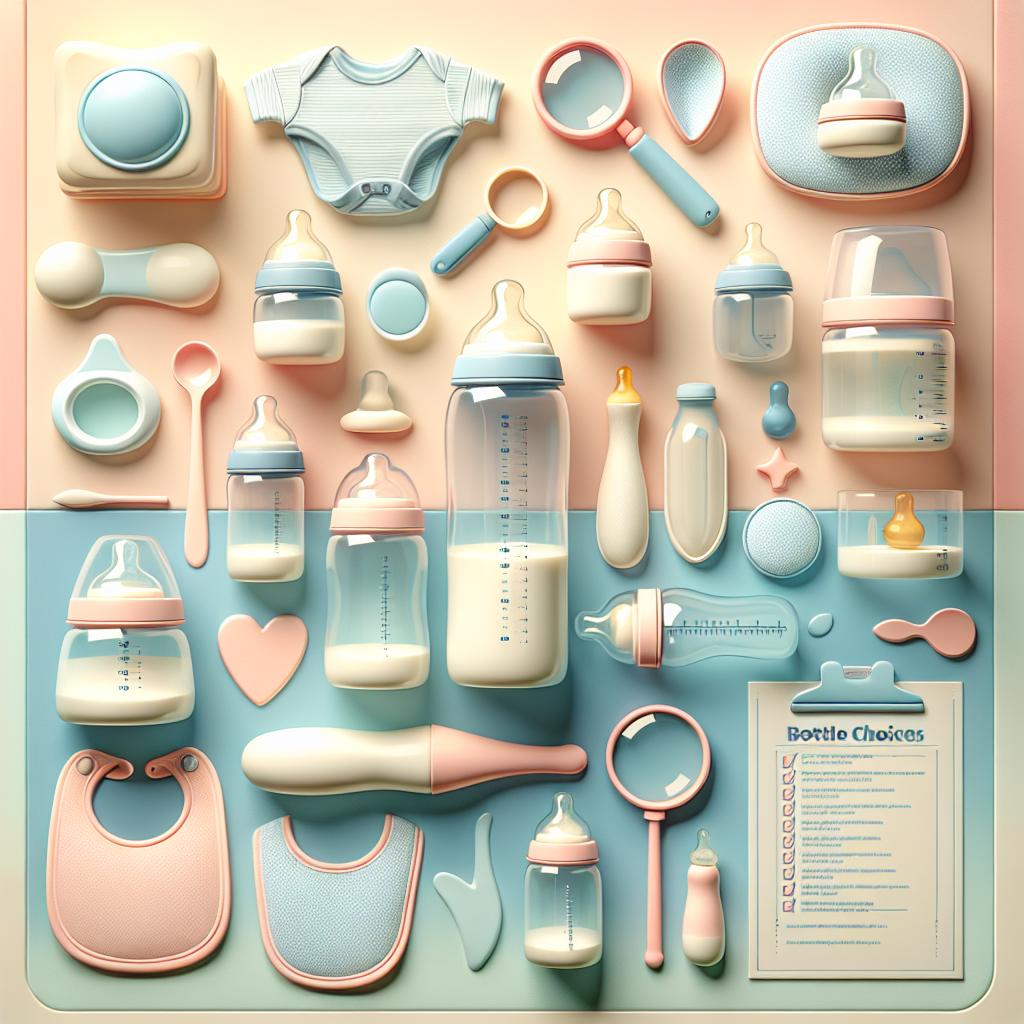Understanding the Fundamentals of Informed Bottle Choices
When it comes to nourishing your baby, responsible feeding is crucial and making informed bottle choices is an essential part of it. This practice starts by understanding your baby’s feeding needs as well as the different bottle options available. This article aims to guide you through this process and provide reliable resources to assist you in making the best decision.
Why Make Informed Bottle Choices?
Informed bottle choices can significantly contribute to your baby’s overall well-being. Babies have delicate and unique digestive systems that need to be nurtured, and the right feeding equipment plays an essential role in it. By making informed decisions, you can ensure that your baby gets an experience closest to natural breastfeeding. This practice is crucial in maintaining your baby’s health and development, and it can also save you from potential feeding struggles.
What to Consider in Making Informed Bottle Choices
Several factors come into play when making informed bottle choices for your baby. Here are some key considerations to keep in mind:
- Your baby’s age and developmental stage: A newborn baby might have different bottle requirements than an older baby. Ensure that the bottle you choose is appropriate for your baby’s age and stage of development.
- The bottle’s material: Baby bottles are commonly made of plastic, glass, or stainless steel. Each has its pros and cons.
- The bottle’s design: Some bottles are designed to mimic the natural feel of breastfeeding. These are called biomimetic bottles and are proven to be beneficial for a baby’s comfort and well-being. Check out our guide on biomimetic bottles to learn more about their benefits.
- The nipple’s flow rate: Too fast or too slow flow might upset your baby. Choose a bottle with a nipple that has an appropriate flow rate for your baby’s feeding style.
Tapping into Reliable Sources of Information
With the abundance of information available online, it can be challenging to identify reliable sources. Here are some trusted platforms that provide scientifically backed data and insights to help you make informed bottle choices:
- Your Pediatrician: A medical professional can provide tailored advice based on your baby’s health and nutritional needs.
- Responsible Feeding Guides: Comprehensive guides like this one provide in-depth insights into making informed bottle choices.
- Online Parenting Forums: Filtering out the noise, some platforms share practical advice based on real-life experiences from other parents.
Takeaway
In conclusion, making informed bottle choices contributes to responsible feeding and your baby’s well-being. It involves understanding the unique needs of your baby, considering different bottle options and tapping into reliable resources. Now that you are equipped with relevant knowledge, you can confidently choose the best baby bottles for your little one. Remember, your baby’s health and comfort are paramount, and the choices you make play a vital role in ensuring their well-being.
Insight Into Different Bottle Materials
Before making an informed choice about baby bottles, it’s crucial to know the various materials they are made from. This helps in choosing a bottle that’s not only safe but also durable, easy to clean, and comfortable for the baby to use.
Plastic Baby Bottles: Most common among parents due to their lightweight and unbreakable nature. They are inexpensive but wear out faster, requiring frequent replacement. More importantly, make sure to choose BPA-free plastic bottles to ensure safety, as Bloom Baby points out in this article.
Glass Baby Bottles: They are environmentally friendly, don’t scratch, and last longer than plastic bottles. However, they are heavier and can break easily.
Stainless Steel Baby Bottles: Stainless steel baby bottles are durable, scratch-resistant, and can keep the milk warm or cold for a longer period. Despite being more expensive, they are a great long-term investment with their durability and safety standards.
Considering Your Baby’s Age and Development
As important as the bottle material is the right bottle choice for your baby’s age and development, which changes over time. For instance, a newborn would generally need a smaller bottle with a slow-flow nipple, while an older baby can handle a larger bottle with a faster-flow nipple. The Disney Plan’s informative article is a good resource for understanding the importance of adapting to your baby’s changing needs.
Common Bottle Feeding Challenges
Bottle-feeding may pose certain challenges. Recognizing these can help you stay prepared:
- Bottle rejection: Remember that each baby is unique and might respond differently to bottles. Experiment with different brands and styles to find the one that your baby prefers.
- Difficulty in finding the right nipple: The nipple’s shape, material, and flow rate can greatly impact your baby’s feeding experience.
- Gas and colic: Some bottle designs trap air bubbles, causing your baby to swallow a lot of air. This might lead to colic, so choose bottles with venting systems or angled shapes to combat this issue.
- Transition from breast to bottle: Babies usually take time to adjust to a change in feeding methods. Therefore, if you’re transitioning from breastfeeding to bottle-feeding, find a bottle that mimics the mother’s breast to ease the transition.
Bottle Feeding Tips
Choosing the right bottle for your baby is only half the battle won. Knowing how to bottle feed your baby effectively can enhance both your experience. Read this informative article for essential tips on bottle feeding:
- Hold your baby closely: This fosters a bonding experience similar to breastfeeding.
- Check the bottle’s temperature: Make sure the milk is just the right temperature by testing a few drops on your wrist.
- Don’t force-feed: Let your baby set the pace of feeding. It’s normal for them to take frequent breaks.
- Proper cleaning: Thoroughly clean and sterilize all parts of the bottle after each use.
Keep in mind that the best bottle for your baby depends largely on their unique needs and preferences. Always be ready to experiment, and consider consulting with a pediatrician, joining parenting forums, or seeking help from verified guides.
Now that you’re well-informed, navigate the world of baby bottles confidently and make the perfect choice for your little one.

